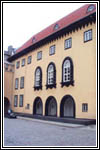 |
Vol 0, No 28
6 April 1999 |
|
|
 T H E A M B E R C O A S T:
T H E A M B E R C O A S T:
A Nordic Freeze? Mel Huang Arguably, Estonia's success in its post-1991 transformation from Soviet occupied territory to the leading reformer in Central and Eastern Europe can be attributed to the deep relations with its northern neighbour Finland. However, in recent months the relations have been slowly deteriorating and, sadly, a sense of mistrust is brewing in the air. All of this comes in the run-up to Finland's six-month presidency of the European Union, which begins in July. Realising the need to revitalise this centuries-old link, Foreign Minister Toomas Hendrik Ilves -- returning to the post following the March elections -- makes his first official trip abroad across the Gulf of Finland. The links between Estonians and Finns are tremendous. The two nations share a similar culture, history, heritage and language. As The Economist has noted, "Tallinn is probably the only foreign city in the world where a poetry reading in Finnish can attract a crowd." The 85-kilometre distance between Tallinn and Helsinki served as another link, as tourism between the two kindred peoples continue to grow. For example, the first international flight by Finnair in the 1920s was made to Estonia. These days, millions of Finns visit Estonia annually; albeit, most are "alcohol" tourists. Current loggerheads However, several arguments between the two countries strain the otherwise close ties. The predominant dispute is over the lucrative shipping market. The activities of the Estonian Shipping Company were placed in serious jeopardy when their key Tallinn-Helsinki-Arhus line was effectively shut down by Finnish action. The row began when Finnish longshoremen called for a wage rise for their Estonian counterparts. However, the demands by the Finns were met with some humour in Estonia, as they desired the wage rise for dockworkers to a level exceeding the salary of Estonian President Lennart Meri. It is not surprising that the row has not reached resolution, and the Finns boycotted cargo from the Estonian company. Soon, the industrial action spread to the Danes at Arhus, jeopardising Estonian maritime activities. Labour issues, mostly involving wage levels, have also affected the textiles industry among other sectors. Over these and other issues several Finnish influential papers ran scathing attacks on Estonia. One editorial suggested the new centre-right government would "take Estonia back 50 years" with its policies. It is curious, as the policies of the same group of politicians were nearly universally praised several years ago. Another article in the leading Finnish daily Helsingin Sanomat criticised the judicial system of Estonia, suggesting that it was disadvantageous for Finnish businesses: "Finns doing business in Estonia have to encounter the ever-growing anti-Finnish sentiment." The piece linked the judicial situation with the general deterioration of relations, capped by the shipping row: "But it's dangerous for Estonia if it becomes a widely accepted notion that law in that country has been degraded into a tool of national vengeance." To suggest that Estonia is using its justice system as retribution for a Finnish court's decision to support the Finnish longshoremen's actions is irresponsible on the part of the leading Finnish daily. Historic relations Of course, the historical split during the days of World War II had forever changed relations between the two countries. Though Estonia (along with Latvia and Lithuania) capitulated to Moscow and was subsequently occupied for five decades, Finland waged a brave struggle and nominally held its independence. Even in strife, however, relations were strong. Many Finns fought with the Estonian resistance, and Estonians fought with the Finns against the Soviets. But the Cold War years reaped financial rewards for Finland as an economic conduit between the two spheres, and the economic difference between the two cousins widened drastically. By 1991 and Estonia's restoration of independence, Estonia was dramatically poorer than Finland -- many Estonians remember that, in 1939, Estonia was richer than Finland and on par with other Scandinavian states. Finland, now having lost its coveted Cold War position, has fallen into a massive economic crisis. Estonia was in the right place at the right time, and the emerging market tiger leaped ahead of many others in the region. Estonia gleefully restored old ties with Finland, and within a short time, Finland became Estonia's main trading partner. Years later, Finland remains one of the biggest players in the Estonian economy. With the growth of the technological market (especially of mobile telephones) and its own EU accession, Finland recovered from its economic woes with Estonian help. The continual growth of the Estonian markets reaps strong rewards for the heavy investment and presence of the Finns. It will recover The relationship between these two kindred nations, however sour it has temporarily become, will no doubt recover in due time. Centuries of ties, as well as the close cultural link, bind the two together. Tourism from Finland will continue, especially with the impending demise of the EU's internal duty-free shopping. Economic ties are of such great intensity that both countries have little choice but to promote better relations. The Finns are much too involved in the Estonian market to let the relations sour further, while the Estonians need its strong ally in Finland to carry them into the Euro-promised land. After all, squabbles among brothers are common. In the end, the peoples will return together as they have for centuries with three basic shared cultural necessities: sausage, vodka and sauna. Blood is thicker than water, even if it's 85 kilometres wide. Mel Huang, 6 April 1999
|
|
![]()
Copyright (c) 1999 - Central Europe Review and Internet servis, a.s.
All Rights Reserved